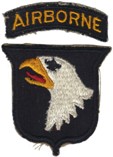Edward "Ed" Hallo was born in 1920 in Toledo, Ohio. His family moved to Detroit in 1925 where he grew up and graduated from Northwestern High school in 1939. Ed went to work at the Ford Rouge plant, but when the war started, he joined the army and volunteered for the Airborne.
Following training Ed Hallo was sent over to England to prepare for the invasion of France. The Airborne was always dropped behind the enemy lines and at night. Soldiers would always be surrounded and trained to break out and complete their mission. Three days prior to D-Day, they made their final training jump at night in England. Over 350 men were injured, mostly with broken bones, and were not able to make the jump on D-Day. Ed Hallo broke his leg and was assigned to guarding equipment. It was there, on the best day of his life, that he met a lovely British girl named Sylvia.
Two months later, the British forces were stalled in France, and the 501st jumped in to break up the enemy attack. This time Ed was there, bad leg and all. With this added pressure to their rear, the German forces pulled back, and the British pressed them on into Holland. A large part on the British force was cut off, and the communications were lost in Nijmegen. The 501st was sent in to open and hold the main road to allow the rescue team to reach the surrounded forces. This was to be a one-day operation, which turned out to be a 72-day mission.
Upon their return to their base in France the 501st was to given some time to rest, and several officers and men went on leave to Paris. One night the orders came down that all personnel were to grab their warm cloths and ammo and get on the waiting trucks. With many of the Officers still on leave, they found themselves in Belgium, just northwest of Bastogne, where they would stay and fight in the Battle of the Bulge. With the 502nd Regiment, (made famous in the Band of Brothers series) to their right, they were surrounded, without food, low on everything, and unable to dig into the frozen ground for shelter. Then came the snow, and it only got colder. Here they were dressed in olive green in a white world, taking constant fire, and the German 88s were blowing down the trees that were their only shelter. Fires would only give away their position to the enemy snipers who were killing anything that moved.
The people in the area gave up their linen so the US forces could cover their helmets and rifles to blend into the snow. With limited ammunition, they had to wait until the attacking forces got within 30 feet before opening fire. Food, weapons and supplies were scavenged from the fallen German soldiers, many of whom fell just feet from their line. The days grew into a week, and the cold, snow and enemy just kept on coming. They were mostly without food, ammo, medical equipment or replacements. Many froze where they feel asleep, and wounds, hunger and jaundice took their toll.
The final German push was set to begin, and the Germans demanded surrender. It was here General McAuliffe gave his famous reply of "NUTS."
General Patton had pushed his forces north for three days to break the siege at Bastogne. With the Germans attacking, Patton's 3rd Armored crashed their flank and entered Bastogne. Then as the skies cleared, the US Air boys went to work, with transports dropping food supplies and medical help. P-51s filled the skies destroying any target they saw. The battle was soon over, and the Boys of Bastogne would now get some rest.
The spring push into Germany began early. The 501st moved into Bavaria and took a look at Hitler's house on their way to Austria. As the allied forces liberated more camps, they feared that the American prisoners of war would be killed also. The 501st was moved to France and equipped to liberate our boys held captive in these camps. The mission was called off because the Russians were moving so fast that many of the camps were abandoned, or in some cases, the Germans marched the captured prisoners to the allied forces and surrendered.
The war for Ed Hallo and he went to England as part of the Army training to attend school. There, he married Sylvia. He was sent home in 1946 and discharged. Sylvia was able to join Ed in 1947 and together during their 56 years of marriage they had a family of eight children. Today Ed lives in Abbey Park, Cleveland, Ohio.





